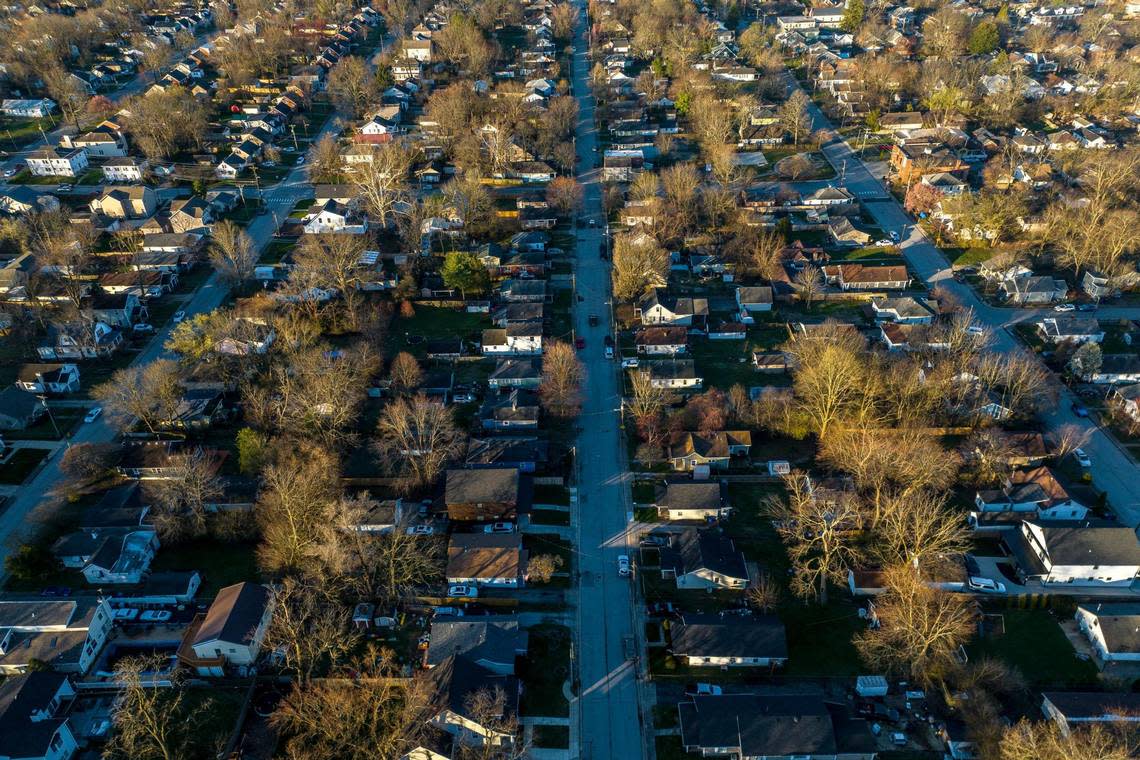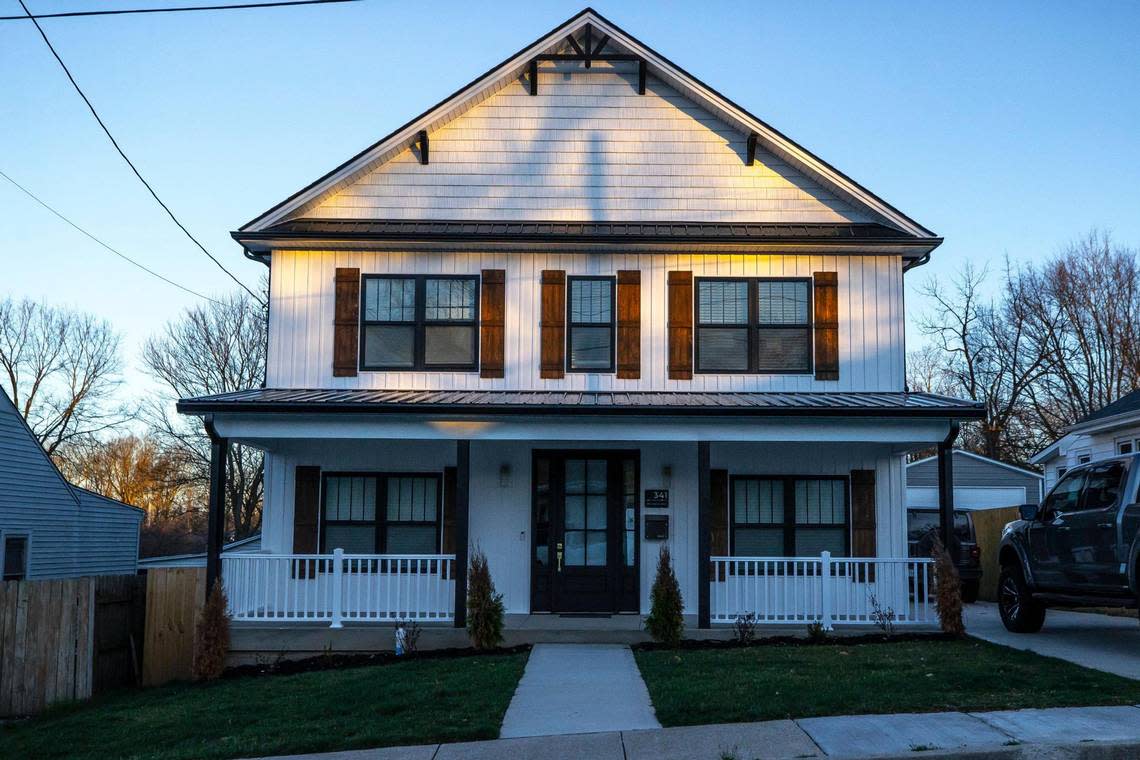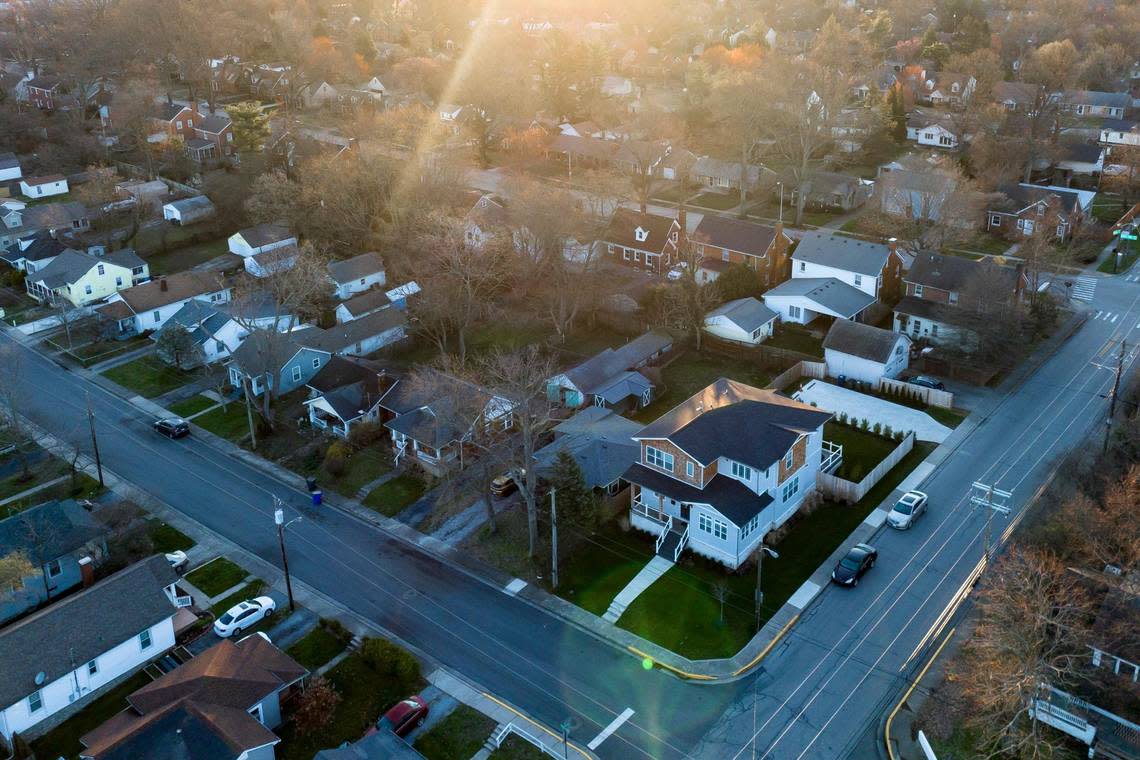‘I want neighbors, not strangers.’ Some Lexington residents worry Airbnbs are taking over
The brick house on Hambrick Avenue is nestled between other historic homes in the desirable Mentelle neighborhood close to Lexington’s downtown. It had been a family home. But its owners, citing a move to another part of the state, wanted to turn it into a short-term rental.
Many residents in the Mentelle and Kenwick neighborhoods told the Lexington Board of Adjustment during a February hearing the neighborhood has been overrun with short-term rentals, such as those listed on Airbnb and VRBO.
“We have 41 short-term rentals and 10 more that are operating illegally,” said Tomi Ross, a member of the Kenwick neighborhood, during the Feb. 12 Board of Adjustment meeting.
Board of Adjustment member Harry Clarke sympathized with neighbors. Clarke said in the months since the Board of Adjustment began issuing conditional use permits for short-term rentals, neighbors have overwhelmingly pushed back.
But the city zoning regulations that determine whether a short-term rental can go into a neighborhood are vague, Clarke said. The city’s ordinance only says the board of adjustment can consider if there are other short-term rentals in the “vicinity.”
There’s no legal definition of vicinity. Is it 600 feet? 1,000 feet? That puts the board of adjustment in a bind, he said.
“The ordinance itself gives us no limitations,” Clarke said. “I’m very disturbed about this ordinance.”
Ultimately, the board of adjustment voted to reject the short-term rental application citing the proximity to Ashland Elementary, which is at the end of the street, and public safety concerns.
The fight over the short-term rental on Hambrick highlights a growing discontent with the city’s short-term rental ordinance, which took effect Jan. 11. Less than two months after it passed, some neighborhoods, including Kenwick and Mentelle, are asking the city to tweak its ordinance and do more to stop or slow the proliferation of short-term rentals in Lexington.
“I want neighbors, not strangers,” said Ross.
Lexington-Fayette Urban County Councilwoman Liz Sheehan, who represents parts of Kenwick and Mentelle, said she has heard concerns from neighborhoods and others about too many short-term rentals in certain areas. The city will launch a new public engagement effort in April to get feedback. The council may revisit the ordinance in May, she said.
The council will also know by May if the Kentucky General Assembly passes a bill restricting local governments’ control over short-term rentals.
Senate Bill 234 would only allow a city to turn down a short-term rental in neighborhoods if there were public safety and other concerns. It would not allow cities to enact limits on the number of short-term rentals in a neighborhood. As of Wednesday, it had not moved out of a Senate committee. The legislature concludes April 15.

Strangers on the street
John Grimes knows who’s playing the University of Kentucky on any given weekend by looking outside his windows to one of 12 short-term rentals on Sherman Avenue in Kenwick where he has lived for decades.
“You know what football game is going on by seeing their fans in the street,” Grimes said. “It’s really changed the character of the neighborhood.”
Weekends, particularly during football season, are usually busy for those short-term rentals. But during the week those homes are largely vacant, Grimes said.
Vacant homes create holes in the fabric of the neighborhood, said Judith Humble, who lives on Lincoln Avenue.
A neighborhood is more than a collection of homes. It’s also a social support network, Humble said. People look after each other’s pets. They pick up their mail when they are gone. They have social gatherings. With so many dark houses and strangers, people no longer know each other, she said.
“It’s very disruptive to the fabric of the neighborhood,” Humble said. “We consider Kenwick one of the most successful neighborhoods in Lexington.”
Ross first started noticing the proliferation of short-term rentals in Kenwick and Mentelle when she started walking daily after she retired a few years ago. Smaller, affordable houses in the 300 blocks of Sherman, Bassett, Lincoln and Owsley were being purchased, flipped or sometimes razed.
In the place of those homes, large structures that can house multiple families for short-term stays were erected. Many in Kenwick call them “the barns” because of the homes’ vertical metal siding.

Ross has lived in the neighborhood since the 1980s. She bought her home for less than $60,000. Kenwick was a place that allowed teachers, university professors, police and others on moderate salaries to buy a home and build wealth in a neighborhood that was close to downtown, she said.
That’s no longer the case.
The uptick in short-term rentals in her neighborhood has sent home prices and property taxes soaring, Ross said. For example, a new home built across the street from her recently sold for nearly $1 million. Her property taxes have doubled in eight years.
The requests to buy her home from real estate investors arrive daily, she said.
“Some of our neighbors can’t afford to say no,” Ross said.
Other downtown neighborhoods have also seen a proliferation of short-term rentals.
Neighborhoods without voices
Castlewood, another older neighborhood on Lexington’s north side, has at least six short-term rentals, city data shows.
Tricia Shaw, a long-time Castlewood homeowner, was excited when she saw a family arrive at the home next door, which had been vacant for months. She brought them baked goods and welcomed them to the neighborhood.
Shaw soon realized her new neighbors weren’t neighbors. They were the first strangers to rent the short-term rental. Just as Kenwick neighbors knows who UK is playing on the weekend, Shaw knows when there is an event at the Kentucky Horse Park by looking outside her door. Large horse trailers are common on her street when those short-term rentals are booked for horse events.
Castlewood, like Kenwick, has amenities — Greyline Station and other restaurants are in walking distance. Castelwood Park has plenty of green space and a pool, which is enticing for families. But parks and pools need to be supported by homeowners to pay for them, Shaw said.
Kenwick and Castlewood also share something else that makes them attractive to short-term term rental operators: a lack of a homeowners’ association. Homeowner associations are common in many neighborhoods built in the 1990s, and most of them prohibit short-term rentals.
There are times when neighbors need to ban together to have input on new development, roads or changes to parks. That’s not going to happen if the neighborhoods turn into places only strangers visit and use occasionally, Shaw said.
“How is this neighborhood going to have a voice?” Shaw said. “This isn’t a neighborhood anymore. It’s sad.”

What needs to change?
Grimes and others say part of the problem is Lexington waited too long — 2023 — to enact its short-term rental ordinance. Louisville has had an ordinance in place since 2015.
“I don’t know how you get the toothpaste back into the tube,” Grimes said.
But people like Ross and Shaw would like to see the city do something similar to what Louisville did in 2023: put more restrictions on how many short-term rentals can be in a certain neighborhood or area. Louisville’s ordinance allows its planning body to look at the number of short-term rentals within 600 feet. That ordinance change was enacted after a similar outcry in Louisville over the proliferation of short-term rentals in certain neighborhoods.
Ross said she would like to see a percentage of houses allowed to be short-term rentals in a certain area, such as no more than 3%.
Covington put a moratorium on all short-term rentals in December 2022 after receiving numerous complaints and discovering hundreds of illegal operators. It lifted the moratorium in June after it re-wrote its short-term rental ordinances. It put a cap on unhosted short-term rentals, where the owner doesn’t live on the property, at 150 for the entire city and put specific caps in place for historic districts.
Due to a lack of housing, some cities, such as New York, have eliminated unhosted short-term rentals entirely.
Walt Gaffield, president of the Fayette County Neighborhood Association, said too many short-term rentals are exacerbating Lexington’s affordable housing problem Officials with the neighborhood association and others had urged the council to set more stringent restrictions on density of short-term rentals when the ordinance was passed in July but those ideas were not included in the ordinance for a variety of reasons.
“Establishing small hotels in neighborhoods ultimately removes residential properties from neighborhoods, and the resulting decline in the supply of houses increases the cost of housing,“ Gaffield wrote in a recent opinion piece.
“It’s pretty much essential that they set some kind of standard,” Gaffield said of a density cap. “Other cities had the same kind of problem, that’s why they stopped licensing for a while.”
Gaffield and others said the city still doesn’t have software in place to help it root out illegal operators. That means Lexington still doesn’t have accurate data on how many short-term rental operators there are in Fayette County.
Wes Holbrook, director of revenue for the city, said the city is in the process of purchasing that software. The Lexington-Fayette Urban County Council will likely take a first vote on the purchase in April.
As of March 20, the city had 579 short-term rentals that were fully compliant with all city regulations. It knows of at least 200 that still do not have all the necessary city sign offs. There are some estimates that there could be north of 900 short-term rentals in Lexington, depending on the season. Some people put homes or apartments on short-term rental websites only for certain events such as Keeneland or UK football season.
Scroll through the interactive map below to where short-term rental homes are located in Lexington-Fayette County. Having trouble viewing this map? Click here.
Laura Calmes and Daniel Miller have one short-term rental on Lexington’s north side. Calmes and Miller said when they started two years ago there were only two short-term rentals in a mile. Now there are nearly 30.
Calmes said she understands neighborhoods concerns about having too many in one area.
“I wouldn’t buy a McDonald’s franchise if there were 10 in an area,” Calmes said.
But Calmes and Miller said they struggled during the licensing process to get accurate information from the state and the city about what they needed to do to be in compliance with all the new rules. The Jan. 11 deadline was not at first communicated to them, she said. To get full compliance from operators, the rules and regulations should be easy for operators to understand.
“I think it’s a learning process for everyone,” Calmes said.
Calmes and Miller said short-term rentals give the city’s visitors options and bring in revenue. Many of the people who stay in their short-term rental are coming to the Kentucky Horse Park, going to concerts at Rupp Arena or go to UK games.
“It’s value added for our community,” Calmes said of short-term rentals. “People love coming to Lexington.”
